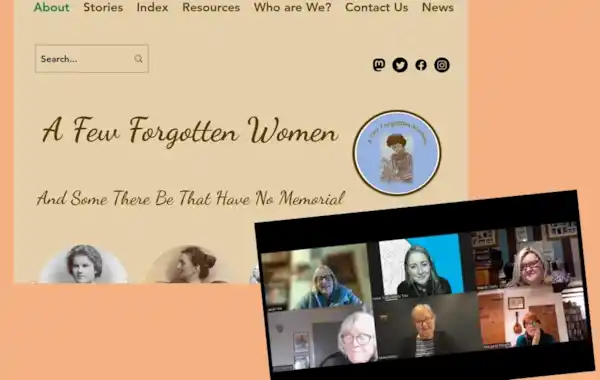10 January 2023
|
United by friendship and their passion for preserving the past, a group of family historians began collaborating on a project during the Covid lockdowns. Now the fruits of their labours are available online for us all to explore. Introducing the 'A Few Forgotten Women' project.
Above: an interview with members of the A Few Forgotten Women project: Dr Janet Few, Ann Simcock, Helen Shields, Mandy Geary and Margaret Roberts. Find out more about the project, read the stories, and discover further members of the team at https://afewforgottenwomen.wixsite.com/affw
Why was the project needed & via which routes were the stories uncovered?
'Wife of', 'Widow of', 'Mother of', 'Unpaid domestic duties'. You've heard these words before. Time and again, in the course of tracing our family histories the women we hope to encounter leave less of a papertrail. Sometimes they are completely absent from documentation (think of most English and Welsh marriage registration details, on which the mother's names (of the bride and groom) were for many decades entirely omitted until the change in the law in 2021). Sometimes it is their lack of literacy or property ownership that denies them a place in the documented past. At other times it is a consequence of the events that occurred in their lives and the moral judgement that left them virtual outcasts, or at least viewed as morally reprehensible - judged, with no recourse to share their side of the story.
As Janet Few says, 'We kept coming across these ladies who were a little bit neglected, and no one was taking an interest in them. But we felt it was important that their stories should be told. And it's always fun doing things together. So we decided we'd work on this as a group.' It is to shine a light on these lives, and ensure that their stories are learned, shared and remembered that the A Few Forgotten Women project was born.
Who do the stories cover?
Some of the stories were uncovered in the course of the project members' personal family history research, others were encountered via their one-name studies, one-place studies, or other genealogically focussed work. To date, the stories come from foremothers living in the British Isles, but this may well be expanded on in the future.
As Helen Shields explains, it is particularly hard to trace the unvoiced, to piece together the stories when the details aren't well-known perhaps: 'We worked together on Zoom on some of the stories. One of those was that of Ann Palmer... and I was really pleased to be able to find the name of the baby in a different newspaper article. [The stories] are just people we come across. Most of them are not "mad or bad", they are just neglected.'
Speaking of "mad or bad" did you notice any themes, and if so what were they?
Mandy Geary: 'The themes that we look at have been quite widespread. They vary from the obvious things like illegitimacy, poverty and alcoholism, to mental health, criminality, murder... Some fit in multiple categories.' To complicate matters further, Mandy explains: 'The thing is women are so often not included in records. There were no names...' - the records solely detailed the man's (father, husband) name.
How do you treat the ethical path, between telling distressing stories, and including the lives of the unvoiced?
'I think the important thing that we have to remember, when we are researching these ladies, is that they don't live our times.' Ann Simcock urges us to consider this. 'When we tell their story, we have to remember that they were real people. And we have to think about how to address their story and how we make it as sympathetic as possible.'
Janet Few added to this: 'I think it's important we tell the story without judgement, and, if there are obvious descendants, then we've contacted them and asked them.'
This aspect of the project - telling sometimes distressing stories but being mindful of the impact of their retelling today - is an aspect of the project about which the team members have thought long and hard. Margaret Roberts shared her thoughts: 'You have to tread carefully. You have to realise what sort of lives these women lived, and how they lived.... Not treading on eggshells, but you have to tread lightly.'
What's next for the A Few Forgotten Women project?
To encourage people to tell stories of their own. Passionate researchers and writers, the A Few Forgotten Women team urge fellow family historians to write up their own family stories, particularly perhaps concentrating on aspects of our family trees that are less frequently looked at, in order to understand and remember our forebears' lives more fully.
To find out more and to read the stories, please visit https://afewforgottenwomen.wixsite.com/affw







